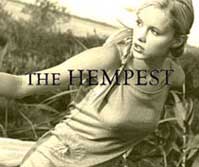Angela Davis, a case of acquired activism

Born: January 26, 1944, Birmingham, Alabama, Davis received a B.A. from Brandeis University in 1965. She later studied as a doctoral candidate at the University of California, San Diego, under the Marxist professor and 'One Dimensional Man' (1964) author Herbert Marcuse.
She joined the Communist Party in 1968, and like many American Blacks during the late 1960s, suffered discrimination for her personal political beliefs and commitment to revolutionary ideals. But it was not until 1969 that she came to national attention after being removed from her teaching position in the philosophy department at UCLA by the California Board of Regents, under then CA Governor Ronald Reagan's administration.
Davis had worked to free the Soledad (Prison) Brothers, African-American prisoners held in California during the late 1960s. She befriended George Jackson, one of the prisoners accused in an August 7, 1970 abortive escape attempt from Marin County's Hall of Justice, the trial judge and three people were killed, including George Jackson's brother Jonathan. Davis was implicated when police claimed that the guns used had been registered in her name.
Davis fled and was subsequently listed on the FBI's Top 10 Most Wanted list sparking one of the most intensive manhunts in American history. That August, Davis was captured and imprisoned in New York City but freed by an all white jury eighteen months later, cleared of all charges.
Today Davis is a professor of history of consciousness at the University of California-Santa Cruz. Davis is known internationally for her ongoing work to combat all forms of oppression in the United States and abroad.
Davis remains an advocate of prison abolition and has developed a powerful critique of racism in the criminal justice system. She is a member of the advisory board of the Prison Activist Resource Center, and is currently working on a comparative study of women's imprisonment in the United States, the Netherlands, and Cuba.
During the last 25 years, Davis has lectured around the world. Her articles and essays have appeared in numerous journals and anthologies, and she is the author of five books, including “Angela Davis: An Autobiography; Women, Race, and Class” (Vintage, 1983), “Blues Legacies and Black Feminism: Gertrude ‘Ma’ Rainey, Bessie Smith, and Billie Holiday” (Vintage, 1999), and “The Angela Y. Davis Reader” (Blackwell Publishing Limited, 1998).
Greener Magazine
Davis video segment
Davis' writing: History is a weapon
Keywords:: ANGELA DAVIS OPPRESSION SOLEDAD EQUALITY
Labels: Human Rights



9:11 PM









<< Home